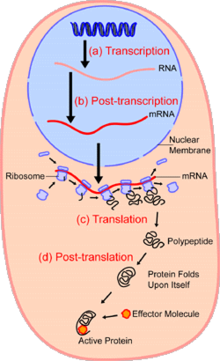單細胞分析
此條目可參照英語維基百科相應條目來擴充。 (2020年1月15日) |
在細胞生物學中,單細胞分析(英語:single-cell analysis)是在單一細胞層級上的基因體學(genomics)、轉錄體學(transcriptomics)、蛋白質體學(proteomics)與代謝體學(metabolomics)的研究。[1][2]因為原核與真核細胞的族群皆有異質性,所以分析單一細胞可能發現研究整個細胞族群時無法觀測的機制。[3] 螢光激發的細胞分選(FACS)之類的科技可將被選取的單一細胞從複雜的樣本中精確地分離出來,而高通量的單一細胞分割的科技[4][5]可以同時執行數百或數千個單一未分選的細胞的分子分析,這對分析基因型相同的細胞群中總轉錄本(transcriptome)的變異特別有用,使人們可以定義以其他方法無法偵測的細胞子類型。新科技的發展使人們更有能力分析單一細胞的基因體(genome)與總轉錄本,還有量化它的蛋白質體(proteome)與代謝體(metabolome)。[6][7][8]質譜法的一些新發展已經成為用來做單細胞的蛋白質體與代謝體分析的重要分析工具。[9][10]原位定序與螢光原位雜交(FISH)不要求分離細胞,這些技術越來越常被用來做組織的分析。[11]

參考文獻
編輯- ^ Wang D, Bodovitz S. Single cell analysis: the new frontier in 'omics'. Trends in Biotechnology. June 2010, 28 (6): 281–90. PMC 2876223 . PMID 20434785. doi:10.1016/j.tibtech.2010.03.002.
- ^ Habibi I, Cheong R, Lipniacki T, Levchenko A, Emamian ES, Abdi A. Computation and measurement of cell decision making errors using single cell data. PLoS Computational Biology. April 2017, 13 (4): e1005436. PMC 5397092 . PMID 28379950. doi:10.1371/journal.pcbi.1005436.
- ^ Altschuler SJ, Wu LF. Cellular heterogeneity: do differences make a difference?. Cell. May 2010, 141 (4): 559–63 [2020-01-17]. PMC 2918286 . PMID 20478246. doi:10.1016/j.cell.2010.04.033. (原始內容存檔於2017-04-19).
- ^ Mora-Castilla, S., et al. "Miniaturization technologies for efficient single-cell library preparation for next-generation sequencing" Journal of Laboratory Automation (2016): 557–67, https://doi.org/10.1177/2211068216630741
- ^ Zheng GX et al, Nat Commun. 2017, 「Massively parallel digital transcriptional profiling of single cells」, DOI:10.1038/ncomms14049 (頁面存檔備份,存於網際網路檔案館)
- ^ Huang L, Ma F, Chapman A, Lu S, Xie XS. Single-Cell Whole-Genome Amplification and Sequencing: Methodology and Applications. Annual Review of Genomics and Human Genetics. 2015, 16 (1): 79–102. PMID 26077818. doi:10.1146/annurev-genom-090413-025352.
- ^ Wu AR, Wang J, Streets AM, Huang Y. Single-Cell Transcriptional Analysis. Annual Review of Analytical Chemistry. June 2017, 10 (1): 439–462. PMID 28301747. doi:10.1146/annurev-anchem-061516-045228.
- ^ Tsioris K, Torres AJ, Douce TB, Love JC. A new toolbox for assessing single cells. Annual Review of Chemical and Biomolecular Engineering. 2014, 5: 455–77. PMC 4309009 . PMID 24910919. doi:10.1146/annurev-chembioeng-060713-035958.
- ^ Comi TJ, Do TD, Rubakhin SS, Sweedler JV. Categorizing Cells on the Basis of their Chemical Profiles: Progress in Single-Cell Mass Spectrometry. Journal of the American Chemical Society. March 2017, 139 (11): 3920–3929. PMC 5364434 . PMID 28135079. doi:10.1021/jacs.6b12822.
- ^ Zhang L, Vertes A. Single-Cell Mass Spectrometry Approaches to Explore Cellular Heterogeneity. Angewandte Chemie. April 2018, 57 (17): 4466–4477. PMID 29218763. doi:10.1002/anie.201709719.
- ^ Lee JH. De Novo Gene Expression Reconstruction in Space. Trends in Molecular Medicine. July 2017, 23 (7): 583–593. PMC 5514424 . PMID 28571832. doi:10.1016/j.molmed.2017.05.004.